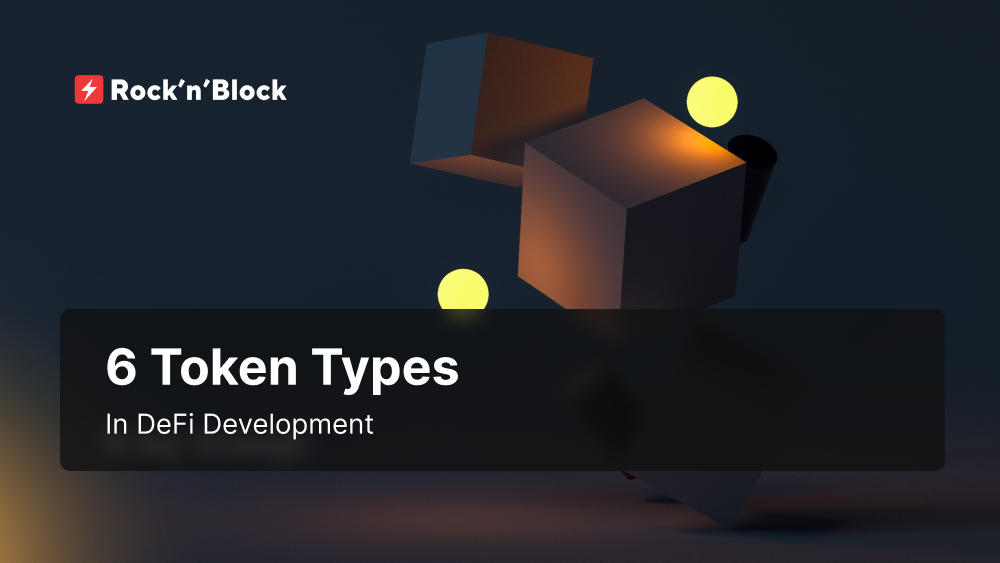6 Token Types in DeFi Development
 RocknBlock
RocknBlock
Welcome to our comprehensive guide on different types of tokens in DeFi token development, where we embark on an insightful journey through the diverse facets of decentralized finance. From understanding the foundations to delving into common standards, and navigating specific types like governance, utility, payment, stablecoins, wrapped and liquidity provider tokens – this guide is your roadmap to the dynamic world of DeFi token development.
Role of Tokens in DeFi Development
DeFi tokens reshape finance by serving as programmable units of value and representation within DApps. They facilitate direct peer-to-peer transactions, eliminate intermediaries, and empower users with asset control. Beyond transactions, tokens enable decentralized governance, voting rights, and incentivize user participation through liquidity provision, yield farming, and staking. In the DeFi space, tokens are crucial for value and functionality, promoting financial innovation and creating an inclusive and accessible financial landscape. Understanding these diverse roles is key to grasping the transformative potential of decentralized finance.
🌐 Read our full article here!
Common DeFi Token Standards
DeFi's transformative force is fueled by key token standards. ERC-20 tokens on Ethereum serve as the decentralized backbone, representing various assets. In contrast to ERC-20, ERC-721 tokens introduce non-fungibility, redefining the concept of uniqueness in the digital realm. Often associated with NFT development, ERC-721 tokens enable the representation of one-of-a-kind items, such as digital art, collectibles, and in-game assets. Meanwhile, BEP-20 tokens on BNB Chain provide cost-effective alternatives, enabling faster transactions and lower fees, exemplified by PancakeSwap tokens and Venus stablecoins. These standards illustrate tokens' diverse roles, revolutionizing finance and expanding possibilities in digital ownership and financial efficiency within DeFi.
Governance DeFi Tokens Development
DeFi, grounded in decentralization and user empowerment, relies on governance tokens to place decision-making authority directly in the hands of the community. These digital assets empower holders by granting voting rights and the ability to influence the development of decentralized protocols. Acting as stakeholders, users with governance tokens actively participate in proposing and voting on changes to the protocol, fostering a democratic approach that aligns with the principles of decentralization. Beyond mere transactions, user governance encourages active contribution, allowing the community to collectively shape the trajectory of the decentralized ecosystem and instil a sense of shared responsibility among users.
Utility DeFi Tokens Development
Utility tokens in DeFi drive innovation by offering diverse functionalities beyond basic value transfer. Acting as keys to decentralized services, they represent access to premium features, discounted fees, or exclusive benefits. Unlike governance tokens, utility tokens focus on enhancing user experience by enabling specific functionalities within decentralized applications. As integral components of DeFi protocols, these tokens contribute to a dynamic and engaging user experience, playing a crucial role in decentralized exchanges, lending, and borrowing protocols.
Payment DeFi Tokens Development
Unlike traditional payment methods, these tokens operate on decentralized networks, utilizing blockchain technology and smart contracts development to enhance security, transparency, and accessibility. One primary use case is facilitating peer-to-peer transactions within decentralized applications, allowing users to transfer value seamlessly across borders without the need for traditional financial intermediaries.
Payment DeFi Tokens often extend beyond basic transactional functions: users may utilize these tokens for staking, yield farming, governance participation, or other multifaceted activities within the decentralized ecosystem.
Stablecoins DeFi Tokens Development
Stablecoins are essential in DeFi token development, offering stability by being pegged to external assets like the US Dollar. Acting as a bridge between crypto and traditional finance, they are favoured for decentralized transactions. Achieving stability through collateralization or algorithms, stablecoins ensure a reliable unit of account within DeFi ecosystems, crucial for consistent valuations in financial activities.
Liquidity Provider DeFi Tokens Development
In DeFi token development, liquidity provider (LP) tokens are pivotal for fueling decentralized exchanges. These tokens represent ownership in liquidity pools, allowing users to actively contribute assets. LP tokens bridge the user-exchange gap, offering proportional shares and potential rewards like governance tokens. While the rewards, including transaction fees and governance incentives, are attractive, it's crucial to acknowledge associated risks such as price impermanence and smart contract vulnerabilities. Striking a balance between risks and rewards is essential, requiring mechanisms to mitigate risks and attract liquidity providers. Understanding these intricacies is vital for both DeFi developers and liquidity providers.
Wrapped DeFi Tokens Development
In DeFi token development, wrapped tokens enable cross-chain interoperability, bridging different blockchain networks and standardizing asset representation. This facilitates the seamless movement of assets across blockchains while preserving their value and characteristics. Wrapped tokens involve pegging assets from one blockchain to create equivalent tokens on another, allowing users to represent assets like Bitcoin on a different blockchain, such as Ethereum. The process includes locking the original asset in a smart contract on the native chain, which then mints an equivalent amount of wrapped tokens on the destination chain.
Conclusion
Our exploration of different types of tokens in DeFi token development unveils the intricate layers that shape the decentralized financial landscape. As the DeFi ecosystem continues to evolve, understanding these token types becomes paramount for navigating the ever-expanding possibilities and innovations within this dynamic realm. Whether you're a developer, investor, or enthusiast, this guide serves as a comprehensive resource, providing insights into the multifaceted nature of DeFi token development and its transformative impact on the future of finance.
Subscribe to my newsletter
Read articles from RocknBlock directly inside your inbox. Subscribe to the newsletter, and don't miss out.
Written by

RocknBlock
RocknBlock
Welcome to Rock'n'Block, where innovation meets security in the world of blockchain development. As a cutting-edge company, we specialize in crafting decentralized solutions that empower businesses with transparency and efficiency. Our expert team merges creativity with technology to build robust blockchain applications, ensuring our clients stay ahead in the digital revolution.